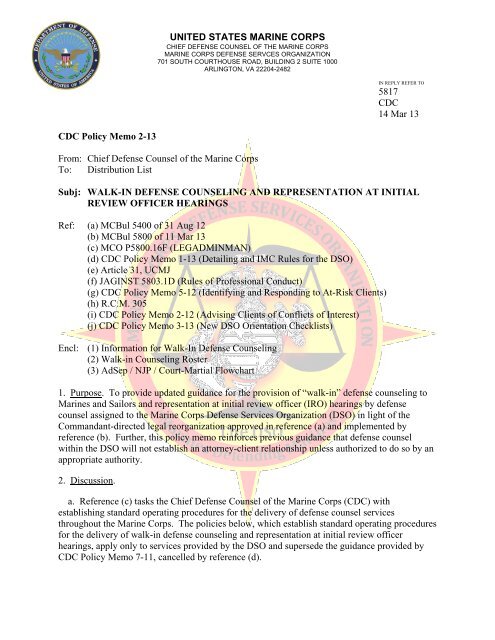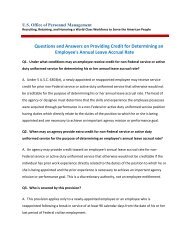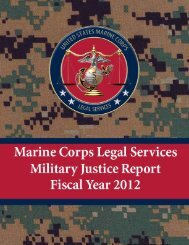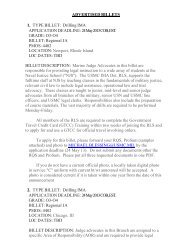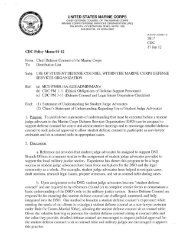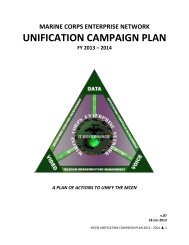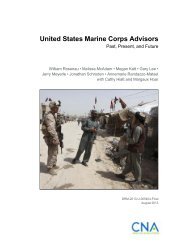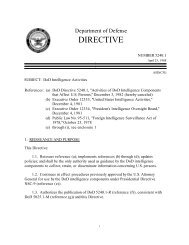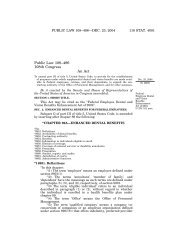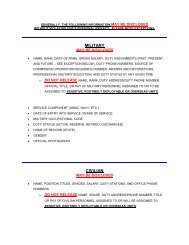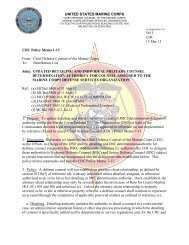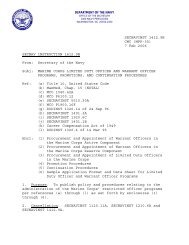CDC Policy Memo 2-13 - Headquarters Marine Corps
CDC Policy Memo 2-13 - Headquarters Marine Corps
CDC Policy Memo 2-13 - Headquarters Marine Corps
Create successful ePaper yourself
Turn your PDF publications into a flip-book with our unique Google optimized e-Paper software.
Subj: WALK-IN DEFENSE COUNSELING AND REPRESENTATION AT INITIALREVIEW OFFICER HEARINGS(4) When forces deploy forward without a defense counsel, the DSO is still responsiblefor providing walk-in counseling. The responsible RDC will coordinate with the staff judgeadvocate of the deployed command and establish support plan for the provision of walk-incounseling to <strong>Marine</strong>s and Sailors assigned to the deployed command that is responsive to theneeds of the deployed commander.(5) The charge sheet, administrative separation notification or similar documents; pages11 and 12 of the Service Record Book; and a summary of the evidence that will be used at thehearing, if applicable, must be provided before a defense counsel will be made available toprovide walk-in counseling – whether done in-person or remotely. If a <strong>Marine</strong> or Sailor comesin for walk-in counseling and does not have these materials, a member of the DSO may contactthe command in order to obtain those documents. If the command refuses to provide therequired documentation, the SDC should contact the respective staff judge advocate to resolvethis issue. Without adequate resolution, the SDC may refuse to provide the requestedcounseling.(6) Prior to conducting walk-in counseling, a conflict of interest check will be conductedand the defense chief will normally show the <strong>CDC</strong>-approved video which is designed to answermany routine procedural questions regarding nonjudicial punishment, summary courts-martial,and administrative separation boards.(7) While in-person counseling is preferred, it is not always possible because of thelocation of the <strong>Marine</strong> or Sailor needing counseling or due to certain operational requirements.In such situations, the SDC may authorize that the counseling be conducted remotely over thetelephone or via Defense Connect Online. The command is still required to provide the defensebranch office with copies of the charge sheet, administrative separation notification, or similardocumentation regarding the allegations; pages 11 and 12 of the Service Record Book; and asummary of the evidence that will be used at the hearing.(8) During the counseling session, defense counsel will use enclosure (1) to guide thediscussion concerning the legal issues and, as mandated by reference (h), will provide each<strong>Marine</strong> or Sailor counseled the Tools for Coping with Stress <strong>Memo</strong>randum.(9) DSO members will not sign forms or otherwise act as a witness attesting that the<strong>Marine</strong> or Sailor needing counseling has sought legal advice.(10) At times, it may be necessary to provide walk-in counseling to <strong>Marine</strong>s or Sailorswith adverse interests, e.g. large drug or hazing rings being resolved at NJP. In such situations,which must be approved by the SDC, the defense counsel providing the counseling will not haveprivileged or confidential communications with the <strong>Marine</strong>s or Sailors seeking the counseling.That defense counsel may not later be detailed to represent any of the <strong>Marine</strong>s or Sailors beingcounseled at any hearing arising out of the facts related to the joint walk-in counseling. The<strong>Marine</strong>s or Sailors receiving the joint walk-in counseling must be notified of these limitations ontheir communications with the defense counsel.(11) Unless the defense counsel has been authorized to form an attorney-clientrelationship with the accused, a defense counsel will not advise the <strong>Marine</strong> or Sailor being3
Subj: WALK-IN DEFENSE COUNSELING AND REPRESENTATION AT INITIALREVIEW OFFICER HEARINGScounseled to accept or refuse nonjudicial punishment/summary court-martial, to request anadministrative board, or whether or not to make a statement to investigators. To allow the<strong>Marine</strong> or Sailor to make an independent decision, the defense counsel should, based on theinformation provided, present the risks and benefits of either accepting or refusing nonjudicialpunishment/summary court-martial, requesting and administrative board, or making a statementto investigators.(12) Defense offices will keep a record of all <strong>Marine</strong>s and Sailors who are provided walkincounseling in a format such as enclosure (2) that allows for entry into the DSO’s CaseInformation System and provides a record of compliance with reference (g) by the individualattorney.c. Representation at Initial Review Officer Hearings. Unless the accused has previously beendetailed a defense counsel, SDCs shall ensure a defense counsel is assigned to represent <strong>Marine</strong>sand Sailors at initial review officer (IRO) hearings conducted under reference (h). The defensecounsel need not be assigned to the LSST that normally supports the command the accused isassigned and may instead come the LSST closest to the confinement facility. A defensecounsel’s representation at an IRO heading is a limited attorney-client relationship related solelyto that IRO hearing. The defense counsel advising an accused concerning pretrial confinementshould limit this advice to the legal issues and factual background surrounding pretrialconfinement. While the communications between the accused and counsel in conjunction withthe IRO hearing may be privileged and confidential and does form a limited attorney-clientrelationship related solely to the IRO hearing, advising an accused of his rights concerningpretrial confinement or speaking on behalf of an accused at an IRO hearing does not, in and ofitself, establish an attorney-client relationship for any other purpose. Unless the defense counselhas been detailed to represent the accused beyond the IRO hearing, the defense counsel shallensure the accused understands that scope of their limited attorney-client relationship. Absent aknowing waiver obtained utilizing the procedures established in reference (i), defense counselshall not represent <strong>Marine</strong>s or Sailors at IRO hearings with adverse interests, e.g., co-accused, orwitness or victim involved in one of that defense counsel’s detailed cases. To allow for a timelyresolution of issues related to conflicts, commands are strongly encouraged to notify the SDC ofknown conflicts prior to the scheduling IRO hearing. When <strong>Marine</strong>s or Sailors with adverseinterests require defense counsel representation at IRO hearings, the responsible SDC willcoordinate locating independent defense counsel for each accused. Although in-personrepresentation is preferred, the SDC may authorize defense counsel representation at an IROhearing be done by telephone or through Defense Connect Online in exceptional circumstances.See subparagraph (f) of reference (i) and its analysis for additional guidance.4. Education. Enclosure (3) is provided to assist counsel in explaining the different processesthat result from an allegation of misconduct and may be helpful in certain circumstances. Use ofenclosure (3) is not mandatory during walk-in counseling; however, all newly-assigned membersof the DSO are required to review this flowchart with their Senior Defense Counsel within thetimeframes set forth in reference (j).4
Subj: WALK-IN DEFENSE COUNSELING AND REPRESENTATION AT INITIALREVIEW OFFICER HEARINGS5. Conclusion. This <strong>CDC</strong> <strong>Policy</strong> <strong>Memo</strong> is effective immediately.Distribution List:SJA to CMCLegal Chief of the <strong>Marine</strong> <strong>Corps</strong>All <strong>Marine</strong> <strong>Corps</strong> SJAsLSSS & LSST OICsAll members of the DSOJoint Defenders CommitteeJ. G. BAKER5
INFORMATION FOR WALK-IN DEFENSE COUNSELINGCONFIDENTIALITY & LIMITS OF COUNSELING• Your communications with the attorney during today’s counseling will be confidential and privileged; he/she may not disclose what you discuss without your permission.However, no attorney-client relationship will be formed. This means that the attorney can answer questions about the process, your rights, and potential impacts ofdecisions but can’t tell you whether you should assert or waive any particular right (e.g., make a statement/remain silent, accept/refuse NJP, accept/refuse summary courtmartial,request/waive an administrative discharge board, accept/deny a pre-preferral agreement, etc.). The attorney you see today is not “your lawyer.”ARTICLE 31(b) RIGHTS, SEARCHES, & POLYGRAPHS• If you are suspected of an offense, you have the absolute right to remain silent and to consult with an attorney. These two rights are different. The Article 31(b) rightsadvisement does not have to be in writing and you don’t have to sign anything to waive them. They can be read to you verbally and you can waive your rights verbally.• If you desire to exercise your right to remain silent or to consult with an attorney, you must explicitly state your desire to do so. For example, if the DNCO, 1stSgt, or PMOsuspect you of misconduct and ask you “What happened here?” It is perfectly okay for you to respond with, “I respectfully wish to remain silent and I would like to see alawyer.” Even after you see an attorney, you still have the right to remain silent and not make a statement. Whether you make a statement is up to you.• If you choose to make a statement, whether written or oral, it can be used against you. This includes conversations with law enforcement, chain of command, friends, family,Facebook, and email. Any statement you make must be truthful. If any part of it is false, you may be subject to further prosecution for making a false official statement.• You don’t have to consent to searches or seizures of your property. For example, if the DNCO, 1stSgt, or PMO asks you, “Is it okay if we search your room / look at youriPhone/ take your computer/ etc.” or “Do you mind giving us a urine sample” it is okay to refuse and to require them to get authorization from your CO (similar to a warrant).• During an interview, law enforcement officers are permitted to be untruthful with you and to embellish the facts in order to get you to incriminate yourself. This means thatthey can say your accomplice confessed when he didn’t, that they have your DNA when they don’t, that they have you on camera when they don’t, and many other things.• Law enforcement officers may offer you an opportunity to take an “exculpatory polygraph” to prove you’re telling the truth. The majority of the time, the results indicatedeception or are inconclusive; the results rarely indicate truthfulness. Just like remaining silent and refusing consent, you have an absolute right to refuse a polygraph.NONJUDICIAL PUNISHMENT (NJP)• You have the following rights:a) Right to be present at the NJP proceeding;b) Right to remain silent;c) Right to a spokesperson. (Will not be a military attorney. May speak for you, but may not question witnesses unless your CO allows it.);d) Right to examine all documents or physical evidence being used to prove the allegation(s);e) Right to present evidence in DEFENSE (proof you didn’t do it), EXTENUATION (circumstances involved), & MITIGATION (why CO should give less punishment);f) Right to have witnesses present if they are reasonably available;g) Right to have proceedings open to the public; andh) Right to refuse NJP up until punishment is imposed (Up until CO says “I impose the following punishment…”). If you refuse NJP, the CO can do the following: 1) nofurther action; 2) administrative action (page 11, reduced pros/cons, adverse fitrep, processing for administrative separation, etc.); or 3) court-martial.• Maximum punishmentCO is O-3 and below Maximum PunishmentCO is O-4 and above Maximum PunishmentRestriction: 14 daysRestriction: 60 days (45 if w/ EPD)EPD: 14 daysEPD: 45 daysForfeitures: 7 day’s payForfeitures: 1/2 of 1 month’s pay for 2 monthsReduction: 1 pay grade (if CO has promotion authority)Reduction: 1 pay grade (if CO has promotion authority)CCU: 7 days (Pvt-LCpl)(not currently being used)CCU: 30 days (Pvt-LCpl)(not currently being used)• While NJP can have a significant impact on your career, it is not a criminal conviction like a special or general court-martial.• National Crime Information Center (NCIC) reporting requirements: All non-military offenses are likely to be report the incident to NCIC, regardless of disposition.
SUMMARY COURT-MARTIAL• A Summary Court-Martial is conducted by a commissioned officer, but not your CO. The officer is supposed to impartially examine the evidence from both sides, to callwitnesses for the Government, to help you obtain evidence, to help you in cross-examining the witnesses, and to help you present your defense. The officer alsodetermines if you’re guilty and determines your sentence.• You have the following rights:a) Right to accept or refuse Summary Court-Martial;b) Right to be present at the proceeding;c) Right to remain silent;d) Right to confront and cross-examine all witnesses and examine all evidence against you;e) Right to plead not guilty, thus requiring the government to prove your guilt beyond a reasonable doubt;f) Right to present evidence in your defense, including the right to have the Summary Court-Martial Officer call witnesses to testify in your behalf;g) Right, if found guilty, to present matters which may mitigate the offense or demonstrate extenuating circumstances as to why you committed the offense; andh) Right to be represented by a civilian lawyer provided by you at your own expense, if such appearance will not unreasonably delay the proceedings and if militaryexigencies do not preclude it.• Rules of Evidence (e.g., hearsay, relevance, etc.) apply at Summary Court-Martial• You are entitled to a copy of the record of trial as soon as it is authenticated.• You have seven days after the sentence is announced to submit matters for your CO’s consideration. These matters may include anything that may reasonably tend toaffect his/her decision whether to approve the finding of guilt or to approve the sentence.• A Summary Court-Martial finding of guilty is not normally considered a “conviction,” but is likely to be report to the NCIC and may be considered a qualifying offense andtrigger certain collateral consequences, such as sex offender registration.COURT-MARTIAL MAXIMUM PUNISHMENTSPunishment Type Summary Court-Martial Special Court-Martial*** General Court-Martial***Confinement 30 days (≤ E-4 only) 12 months (E-9 and below) Life w/o parole or deathRestriction 60 days (E-9 and below) 60 days 60 daysForfeitures 2/3 pay for one month 2/3 pay for 12 months Total forfeituresReduction If ≤ E-4: E-1 / If ≥ E-5: 1 rank If ≤ E-9: E-1 If ≤ E-9: E-1Discharge N/A Bad Conduct Discharge Dishonorable Discharge / DismissalCivilian Conviction? Not normally Yes – usually as a misdemeanor Yes – usually as a felony*** The max punishment depends on which Article(s) of the UCMJ you are found guilty of violating.INVOLUNTARY ADMINISTRATIVE DISCHARGE• Your CO can notify you for involuntary administrative separation for many reasons, all of which are contained in Chapter 6 of MCO P1900.16F. The most commonreasons for notification include, drug abuse, pattern of misconduct, commission of a serious offense, alcohol rehab failure, and weight control failure.• You must be provided a written notice and will be provided an acknowledgement of rights form to complete. You have at least two working days to complete and returnthe acknowledgment. You have a right to consult with an attorney before returning the acknowledgement.• You are entitled to an administrative discharge board if the least favorable characterization of service possible is Other than Honorable (OTH) or you have more than sixyears of service. The board consists of at least three members – one member must be at least an O4, one member must be enlisted and at least an E7. If you exerciseyour right to an administrative discharge board, you will be assigned an attorney to represent you. If you desire to exercise this right, you must select “I do request ahearing before an Administrative Separation Board” on your acknowledgment paperwork.• You are not entitled to a board if the least favorable characterization of service is General (Under Honorable Conditions) or above, or you have less than six years inservice. Even if you are not entitled to a board, you still have the right to submit matters in writing to the Separation Authority (usually your CG). If you desire toexercise this right, you must select “I have included statements in rebuttal to this proposed separation” on your acknowledgment paperwork.
WALK-IN COUNSELING ROSTERRANK LAST NAME FIRST NAME UNIT NJP SEP 31b APPT OTHER ATTORNEY SEEN STRESSMEMO?DATETIME
AdSep / NJP / Court-Martial Flowchart For <strong>Marine</strong> <strong>Corps</strong> Defense ServicesAlleged MisconductCO decides level of seriousness and sends it to one of the following:*AdSepNJPSummary CMSpecial CMArticle 32/General CMWaiver of BoardCO notifies you of intent to process you.You may speak with a defense attorneybefore filling out the acknowledgement.**You may speak to attorney priorto accepting/refusing NJP or SCMRequest for Legal Services Sent to Military JusticeMilJus reviews evidence and drafts chargesSeparationAuthority ActsW-95 Orders,Seps Co. andthen HomeRequest for Legal Services Sent to AdLawIf board is rated, case sent to DefenseBranch & attorney is detailed.You and your defense attorney beginworking on your caseAcceptSentence(See Max Punishment Chart)If 2 or more NJPs or“serious offense”RefuseNPLOC?Nothing? Pg 11 / 6105entry?Charges are preferredCase sent to Defense Branch & attorney is detailedYou and your attorney begin working on your caseIf pleading guiltyIf pleading not guiltyBoard is scheduledPre-Trial Agreement (PTA)Arraignment / Article 32 hearingConditional Waiver(Trying to get Honorable or General)ApprovedDeniedUnconditional Waiver(Trying to get Suspended OTH)AdSep Board occurs(1 O4 or above, 1 CWO2 - O3, 1 E7 or above)Lower Forum?(e.g. GCM to SPCM,SPCM to NJP or SCM)Sentence Cap?(e.g. less brig time,discharge orforfeiture protection)Lower/BetterCharges?Pre-Trial Hearings/MotionsTrialGuiltyNot GuiltyRetentionYou go backto your unit.Honorable GeneralOTHRequest Suspension of Discharge?Sentence(See Max Punishment Chart)Clemency RequestYou returnto yourunit.Separation Authority ActsConvening Authority ActsW-95 Orders, SeparationsCompany, and then HomeSuspended Discharge(for up to 12 months)***Appeals ProcessFinal Action by Appellate Authority* Each step in the process takes time, which can vary widely in duration. From start to finish, the process takes usually at least 2 months and can take over a year to complete.** You will not be detailed a defense attorney if you do not rate a board or if you waive it. Only certain bases under the MARCORSEPSMAN/MILPERSMAN rate a board or if you have 6+ years of service. Forsome bases, the worst possible characterization of service is General Under Honorable Conditions (i.e. BCP failure, convenience of the government, etc).*** While serving during the period of a suspended discharge, you are not eligible for promotion for the entire duration. Any misconduct during the suspension will almost always result in your discharge.


